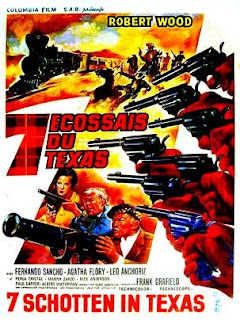 From: Rodd Dana
From: Rodd DanaThe Actor with the 3-D Name
Interview by Michael Barnum
Video WatcHDog No.143 Sep 2008
It would only ve a matter of time before you would find yourself in the Spaghetti Western genre.
My agent had a friend, Amerigo Anton [real name: Tonio Boccia], who was putting together a Western script. He asked me to read it and give him some reliable feedback, since he knew I was born and raised in the "vero-ouest" [the true West]. I never told him I thought the script was awful but, after a couple of sit-downs, he asked if I would like to the do the lead. I said, "Sure," and that was that. I don't know if you've seen KILL OR BE KILLED, but as bad as it is, it was a lot of fun [to make]. After that Amerigo called my agent and said he had another script, this time a dark-psychological Western [GOD DOES NOT PAY ON SATURDAY, 1967], and asked if she would let me play the heavy in it. She said I was off in Tunisia doing a film, but she would ask when I returned. When I got back, she let me read the script (which, again, I thought was awful) but, since I had never played a vengeance hungry killer, I said, "Why not?"
I played the part of Randall, one of the gang of bad hombres, who is shot in a bank robbery escape and left by his friends for dead. However, in the end he returns, dressed in black, to avenge his betrayal... ho hum, and more ho hum... and he is at last permanently dispatched by the good ole good-guy played by my friend Larry Ward. This was just another long, long party, and Amerigo was a real character, right out of Fellini's SATYRICON. He was always trying to get some lady into the proverbial sack and behaved like he thought he was Cecil B. DeMille, at the very least. He even wore the tweeds and jodhpurs with the glossy red leather boots to work, but we all loved him.
[Richard Harrison worked with Amerigo Anton on a film called LA LUNGA CAVALCATA DELLA VENDETTA, aka THE LONG RIDE TO VENGEANCE, which Anton told Richard that he had written. Richard called that into question by noting that his script was the same script Richard had made a few years prior under the title JOKO INVOCA DIO... E MUORI, aka VENGEANCE; a script credited to Antonio Margheriti. So, Anton rearranged the order of the scenes in LONG RIDE and went ahead with the production. By the way, GOD DOES NOT PAY ON SATURDAY is now available on DVD from Wild East on a double-bill with KILL OR BE KILLED under the title KILL THE WICKED.]


























